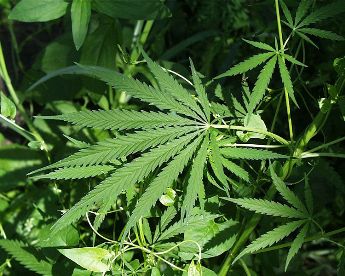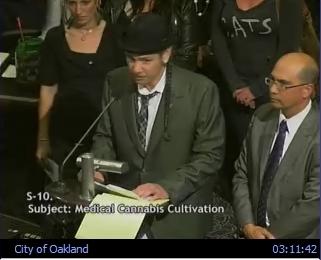Latest

Diane Feinstein Wants to Continue Arresting Marijuana Users, and Other News
Paul Armentano calls out California Senator Diane Feinstein for opposing marijuana legalization and points out the flagrant dishonesty of her attack against Prop. 19.
[image:1 align:left caption:true] Valerie Vande Panne has an excellent piece in the Boston Phoenix on the rising popularity of synthetic marijuana products. This is some of the most thorough coverage I've seen on the issue. A must-read if you're following the Spice/K2 controversy.
Mark Kleiman says California can't legalize marijuana. Pete Guither says yes, it can.
Marijuana policy groups have issued a unified statement opposing Michele Leonhart's nomination to head the DEA. She embodies everything that's wrong with U.S. drug policy, and Obama's nomination makes a mockery of all the "new approach" rhetoric we've heard from his administration.
"The U.S. State Department has no effective way to measure the success of its billion-dollar program to help Mexico and Central America fight drug traffickers," according to a new report from the GAO. Well yeah, it's hard to measure success when you haven't had any. Sounds to me like the problem isn’t that success is hard to measure, but rather that failure is hard to admit.

How to Get Arrested for Marijuana in One Easy Step
[image:1 align:right caption:true]If you'd like to get arrested for marijuana, just tell a police officer that you have some in your car:
The officer pulled Vento over at entrance 13 to Interstate 95. While talking to Vento, he appeared nervous, according to police. When asked why, Vento said he had been arrested in the past on drug charges, police said. The officer then asked if there was anything illegal in the car. Vento said he had a marijuana blunt.
Upon searching the car, police found two more blunts. All three tested positive for marijuana. Police also found a bag with a small amount of marijuana.
Vento posted a $250 bond and was released with a Monday, July 26, court date. [Darien Times]
As you can see, the police don't "go easier on you" just because you made things easier for them. If you admit to a crime, you'll be arrested for it. The constitution protects you against self-incrimination and unreasonable searches, so don't confess and never give police permission to search you or your belongings.
If you need more info on your rights during police encounters, watch 10 Rules for Dealing with Police. Then watch it again.
CA Marijuana Init Worth Hundreds of Millions Yearly, State Analysts Say
EU Court Upholds Dutch Border Town's Ban on Drug Tourism
This Week's Corrupt Cops Stories
Coalition Calls on Obama to Withdraw Michele Leonhart DEA Nomination
Press Release: Medical Marijuana Advocacy Groups Call on Pres. Obama to Withdraw Nomination of Michele Leonhart

FOR IMMEDIATE RELEASEÂ Â Â Â Â Â Â Â Â Â Â Â Â Â Â Â Â Â Â Â Â Â Â Â Â Â Â Â Â Â Â Â Â Â Â Â Â Â Â Â Â Â Â Â Â Â Â Â Â Â Â Â Â Â Â Â Â Â Â Â Â Â Â Â Â Â Â Â Â Â Â Â Â Â Â Â Â Â Â Â Â Â Â Â Â Â Â Â Â Â Â Â Â Â Â Â Â Â Â Â Â Â Â Â Â Â Â Â Â Â Â Â Â Â Â Â Â Â Â Â Â Â Â Â Â Â Â Â Â
JULY 21, 2010
Following Recent Raids, Medical Marijuana Advocacy Groups Call on Pres. Obama to Withdraw Nomination of Michele Leonhart to be DEA Administrator
Obamaâs DEA Head Must Follow Stated Medical Marijuana Policy, End Obstruction of Marijuana Research, and Base Marijuana Rescheduling on Science Rather Than Ideology
CONTACT: Steve Fox: 202-905-2042 or [email protected]; or Mike Meno: 202-905-2030 or [email protected]
WASHINGTON, D.C. â Today, a coalition of organizations supportive of medical marijuana patients and providers (see list of organizations below) is calling on President Obama to withdraw his nomination of Michele Leonhart to serve as administrator of the Drug Enforcement Administration (DEA). Ms. Leonhart, who is currently the DEAâs acting-administrator, has not demonstrated that she is capable of leading the agency in a thoughtful manner at a time when 14 states have enacted medical marijuana laws and science is increasingly confirming the therapeutic benefits of the substance.
           Under Leonhart's leadership, the DEA has staged medical marijuana raids in apparent disregard of Attorney General Eric Holder's directive to respect state medical marijuana laws. Most recently, DEA agents flouted a pioneering Mendocino County (CA) ordinance to regulate medical marijuana cultivation by raiding the very first grower to register with the sheriff. Joy Greenfield, 69, had paid more than $1,000 for a permit to cultivate 99 plants in a collective garden that had been inspected and approved by the local sheriff.
           Informed that Ms. Greenfield had the support of the sheriff, the DEA agent in charge responded by saying, âI donât care what the sheriff says.â The DEA's conduct is inconsistent with an October 2009 Department of Justice memo directing officials not to arrest individuals âwhose actions are in clear and unambiguous compliance with existing state laws providing for the medical use of marijuana.â
           Ms. Leonhart has also demonstrated that she is unable to be objective in carrying out the duties of the administrator as it relates to medical marijuana research. In January 2009, she refused to issue a license to the University of Massachusetts to cultivate marijuana for FDA-approved research, despite a DEA administrative law judgeâs ruling that it would be âin the public interestâ to issue the license. This single act has blocked privately funded medical marijuana research in this country. The next DEA administrator will likely influence the outcome of a marijuana-rescheduling petition currently before the agency. It is critical that an administrator with an open mind toward science and research is at the helm.
           âWith Leonhartâs nomination pending, one would expect her to be more â not less â respectful of the Department of Justice and the rights of individuals in medical marijuana states,â said Steve Fox, director of government relations at the Marijuana Policy Project. âSuch behavior is an ominous sign for the future of the DEA under her leadership. Moreover, she has continually demonstrated her desire to block privately funded medical marijuana research in this country. The Obama administration has reversed many Bush administration policies over the past 18 months. It is time to transform the culture at the DEA by either withdrawing Leonhartâs nomination or directing her to change her attitude toward medical marijuana.â
#Â Â #Â Â #Â Â #Â Â #
The following organizations are calling on President Obama to withdraw the nomination of Ms. Leonhart if she does not end the attacks on individuals acting in compliance with state medical marijuana laws and commit to making decisions related to medical marijuana based on science, not a personal anti-marijuana bias:
Â
California NORML
Drug Policy Alliance (DPA)
Law Enforcement Against Prohibition (LEAP)
Marijuana Policy Project (MPP)
National Organization for the Reform of Marijuana Laws (NORML)
Students for Sensible Drug Policy (SSDP)
Â
With more than 124,000 members and supporters nationwide, the Marijuana Policy Project is the largest marijuana policy reform organization in the United States. For more information, please visit www.mpp.org.
####
Flex Gets Great Response at NAACP Natâl Conf.
Dear friends, Last week I presented 10 Rules for Dealing with Police at the NAACP National Conference. The panel hosted by NAACP's Criminal Justice Program was focused on youth and the criminal justice system. The 200-member audience was mostly high school and college-aged, and I couldnât have hoped for a better reception. The video got an enthusiastic round of applause. More importantly, everyone stayed for the Q&A, which went beyond the allotted hour. Before the screening, I asked if anyone had received any kind of know-your-rights training. Only a handful raised their hands. But afterward, their new knowledge inspired sophisticated questions covering Miranda rights, PATRIOT Act, videotaping police and more. Needless to say, Iâm proud to see 10 Rules resonating with NAACP and communities of color in the way we hoped it would. Weâve long anticipated that our success would depend on the ability to meet the needs of diverse audiences. Weâre excited to see the film earning praise from the NAACP, libertarians and police departments alike. Sincerely, Steve
P.S. If you support this public education work, please consider making a small or large tax-deductible donation online. You may also send a check donation (made out to Flex Your Rights) to P.O. Box 21497, Washington, DC 20009. |
Time is Running Out! Tell Congress to Vote Yes on Crack Reform
| |||||
|
Alabama Compassionate Care/AL NORML Monthly Meeting
Capitol Hill Hearing -- Quitting Hard Habits: Efforts to Expand and Improve Alternatives to Incarceration for Drug-Involved Offenders
Press Release: Hearing to Assess Alternatives to Incarceration For Drug-Involved Offenders
Oakland approves plan to license medical marijuana farms
Abandoning moralistic war on drugs becomes centrepiece of AIDS meeting
Pharmacy board bans K2 synthetic marijuana
Oakland Okays Indoor Medical Marijuana Mega-Farms (FEATURE)

Oakland Okays Mega-Pot Farms
At about 11:15 Pacific time Tuesday night, the Oakland City Council passed an ordinance that would allow for four permitted industrial-scale medical marijuana cultivation facilities. In response to widespread concerns among the medical marijuana community, it also vowed to work on permitting medium-sized grows in the fall and to defer any crackdown on medium-sized grows until after the first large-scale permits are issued in January. Patients can still grow up to 32 square feet and to three-person collectives can still grow up to 96 square feet without permits. Look for a Chronicle feature story on this historic vote to be posted in the morning.

The New Politics of Marijuana Reform
MPP's Mike Meno nails it in this piece at Huffington Post. It's almost as if he's been reading my mind (or my blog). He's got some more great examples of how the surging marijuana policy debate is shaking up party politics this election season. Anyone who still doesn't understand that marijuana is no longer a third-rail political issue is in for some big surprises in the coming years, and possibly as soon as November.
Former Pain Prisoner Appearing on Penn & Teller "Bullshit" This Week
Is America's criminal justice system weighed down with bad science, ineffective methods, incompetence and corruption? Penn & Teller set out to reveal that the only thing scarier than crime is America's war on crime."Criminal Justice" will start airing this Thursday at 10:00pm. In the meanwhile, you can read more about Richard Paey in our archive, at the Pain Relief Network or in the 2006 Sixty Minutes episode, "Prisoner of Pain."
Pagination
- First page
- Previous page
- …
- 420
- 421
- 422
- 423
- 424
- …
- Next page
- Last page







